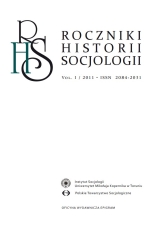Tomáš Garrigue Masaryk jako socjolog
Abstract
Tomáš Garrigue Masaryk, the symbolic founding father of the Czech sociology, profoundly influenced the whole first generation of academic sociologists, who felt obliged to cope with his theoretical heritage. Th e sociologists of the interwar period perceived him as a follower of Comte, praising him as a promoter of the truly scientific study of society, although they criticized inconsistencies of his sociology project and research practice. Blacklisted during the Communist period, Masaryk reappeared only after 1989, this time being presented mostly as an opponent of sociological naturalism, a predecessor of interpretative sociology, or a sociological impressionist. In fact, a closer examination of his sociological writings indicates that the early interpretations were justified. His main inspiration was indeed the Comtean positivism, and although he rejected extreme naturalism and volutionism, their rejection was only a negative program which he himself was not able to follow. Masaryk considered the individual the sole base of the society and the introspective psychology the only foundation of humanities. However, he did not manage to invent any theoretical instruments comparable to those he rejected. As a result, his vision of society was marked by onesided intellectualism and eclectic.
 Roczniki Historii Socjologii
Roczniki Historii Socjologii